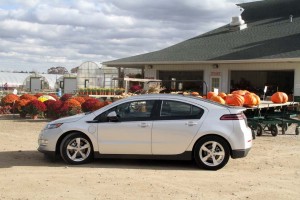Saying the administration hopes to “spark…whole new industries,” Vice President Joe Biden outlined the White House goal of getting 1 million plug-in hybrids on the road.
Since taking office in January 2009, President Barack Obama has expressed strong support for the nation’s nascent battery industry – the administration providing billions of dollars of financial assistance, in both grants and loans, to spur the development of advanced batteries and the vehicles that will put them on the road.
The White House wants to nearly double federal subsidies to buyers, make it easy for customers to collect those payments, and then provide as much as $200 million in assistance to as many as 30 cities to put in place the infrastructure to support a growing fleet of battery cars.
The payoff will be felt not just by the environment but by a nation looking to create jobs, Vice President Biden suggested, during a tour of the New York-based lithium-ion battery manufacturer Ener1.
“We’re not just creating new jobs, but sparking whole new industries that will ensure our competitiveness for decades to come — industries like electric vehicle manufacturing,” said the Vice President.
Both auto and energy industry officials have complained about being caught in a Catch-22 situation. They’re being told to ramp up development and production of battery cars – whether conventional hybrids, plug-ins or pure battery-electric vehicles – but they’re not sure whether there’s true consumer demand.
Estimates vary widely. The recently-completed Drive Green study, by J.D. Power and Associates, predicts all forms of battery-powered vehicles will account for just 7.3% of global demand for 2020. Ford Motor Co. officials say their internal forecasts range from a low of 10% to as much as 25%, depending on a variety of factors including gasoline prices, technological advances – and government support.
The Administration is hoping to assist in several ways. It wants to expand the availability of the current tax credit of up to $7,500 for qualified battery cars. A bill now before Congress would allow that payment on up to 500,000 vehicles, rather than the current 200,000 limit.
But bowing to industry pressure, the White House hopes to shift from a tax credit to an instant rebate. That would make the $7,500 instantly available to assist with a down-payment on a vehicle like the Nissan Leaf or Chevrolet Volt.
The Administration also wants Congress to approve a 30% increase in research and development funding.
Updating the aging power grid infrastructure is considered critical to making it possible for large numbers of battery cars to take to the road. One step being proposed would be a grant of up to $10 million for a community emphasizing advanced vehicle deployment. A total of 30 cities may be chosen, with collective funding to total $200 million.
The White House plans to take charge in driving battery cars onto the nation’s road, Biden noted. It anticipates taken delivery of at least 100 plug-in hybrids this year.

